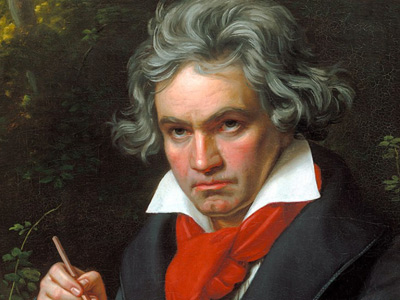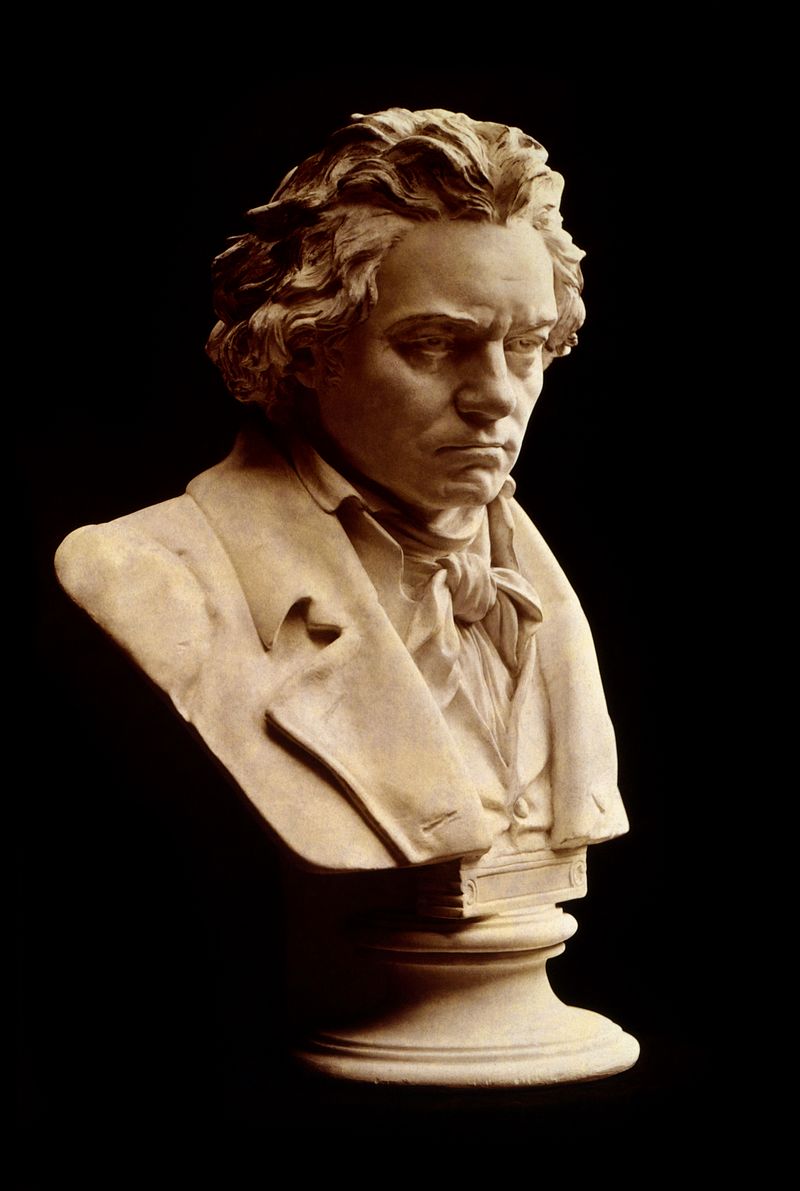Ludwig van Beethoven (1770-1827)
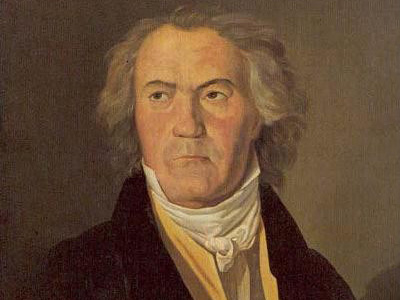
Early Life
Beethoven was the grandson of Ludwig van Beethoven (1712–73), a musician from the town of Mechelen in the Duchy of Brabant in the Flemish region of what is now Belgium Belgium, officially the Kingdom of Belgium, is a country in Northwestern Europe. The country as it exists today was established following the 1830 Belgian Revolution. Belgium has also been the battleground of European powers, earning the moniker the "Battlefield of Europe", a reputation reinforced in the 20th century by both world wars., who at the age of twenty moved to Bonn. Ludwig (he adopted the German cognate of the Dutch Lodewijk) was employed as a bass singer at the court of the Elector of Cologne, eventually rising to become, in 1761, Kapellmeister (music director) and thereafter the pre-eminent musician in Bonn. The portrait he commissioned of himself towards the end of his life remained proudly displayed in his grandson's rooms as a talisman of his musical heritage. Ludwig had one son, Johann (1740–1792), who worked as a tenor in the same musical establishment and gave keyboard and violin lessons to supplement his income. Johann married Maria Magdalena Keverich in 1767; she was the daughter of Johann Heinrich Keverich (1701–1751), who had been the head chef at the court of the Archbishopric of Trier.
Belgium, officially the Kingdom of Belgium, is a country in Northwestern Europe. The country as it exists today was established following the 1830 Belgian Revolution. Belgium has also been the battleground of European powers, earning the moniker the "Battlefield of Europe", a reputation reinforced in the 20th century by both world wars., who at the age of twenty moved to Bonn. Ludwig (he adopted the German cognate of the Dutch Lodewijk) was employed as a bass singer at the court of the Elector of Cologne, eventually rising to become, in 1761, Kapellmeister (music director) and thereafter the pre-eminent musician in Bonn. The portrait he commissioned of himself towards the end of his life remained proudly displayed in his grandson's rooms as a talisman of his musical heritage. Ludwig had one son, Johann (1740–1792), who worked as a tenor in the same musical establishment and gave keyboard and violin lessons to supplement his income. Johann married Maria Magdalena Keverich in 1767; she was the daughter of Johann Heinrich Keverich (1701–1751), who had been the head chef at the court of the Archbishopric of Trier.
Beethoven was born of this marriage in Bonn. There is no authentic record of the date of his birth; however, the registry of his baptism, in a Catholic service at the Parish of St. Regius on 17 December 1770, survives. As children of that era were traditionally baptised the day after birth in the Catholic Rhine country, and it is known that Beethoven's family and his teacher Johann Albrechtsberger celebrated his birthday on 16 December, most scholars accept 16 December 1770 as Beethoven's date of birth. Of the seven children born to Johann van Beethoven, only Ludwig, the second-born, and two younger brothers survived infancy. Kaspar Anton Karl was born on 8 April 1774, and Nikolaus Johann, the youngest, was born on 2 October 1776.
Beethoven's first music teacher was his father. He later had other local teachers: the court organist Gilles van den Eeden (d. 1782), Tobias Friedrich Pfeiffer (a family friend, who provided keyboard tuition), and Franz Rovantini (a relative, who instructed him in playing the violin and viola). From the outset his tuition regime, which began in his fifth year, was harsh and intensive, often reducing him to tears; with the involvement of the insomniac Pfeiffer there were irregular late-night sessions with the young Beethoven being dragged from his bed to the keyboard. Beethoven's musical talent was obvious at a young age. Johann, aware of Leopold Mozart's successes in this area (with his son Wolfgang and daughter Nannerl), attempted to promote his son as a child prodigy, claiming that Beethoven was six (he was seven) on the posters for Beethoven's first public performance in March 1778.
Some time after 1779, Beethoven began his studies with his most important teacher in Bonn, Christian Gottlob Neefe, who was appointed the Court's Organist in that year. Neefe taught Beethoven composition, and by March 1783 had helped him write his first published composition: a set of keyboard variations (WoO 63). Beethoven soon began working with Neefe as assistant organist, at first unpaid (1781), and then as a paid employee (1784) of the court chapel conducted by the Kapellmeister Andrea Luchesi. His first three piano sonatas, named "Kurfürst" ("Elector") for their dedication to the Elector Maximilian Friedrich (1708–1784), were published in 1783. Maximilian Frederick noticed Beethoven's talent early, and subsidised and encouraged the young man's musical studies.
Maximilian Frederick's successor as the Elector of Bonn was Maximilian Francis, the youngest son of Empress Maria Theresa of Austria, and he brought notable changes to Bonn. Echoing changes made in Vienna by his brother Joseph, he introduced reforms based on Enlightenment philosophy, with increased support for education and the arts. The teenage Beethoven was almost certainly influenced by these changes. He may also have been influenced at this time by ideas prominent in freemasonry, as Neefe and others around Beethoven were members of the local chapter of the Order of the Illuminati.
In March 1787 Beethoven travelled to Vienna, possibly at another's expense, for the first time, apparently in the hope of studying with Mozart. The details of their relationship are uncertain, including whether they actually met. Having learned that his mother was ill, Beethoven returned about two weeks after his arrival in Vienna. His mother died shortly thereafter, and his father lapsed deeper into alcoholism. As a result, Beethoven became responsible for the care of his two younger brothers, and spent the next five years in Bonn.
Beethoven was introduced in these years to several people who became important in his life. Franz Wegeler, a young medical student, introduced him to the von Breuning family (one of whose daughters Wegeler eventually married). Beethoven often visited the von Breuning household, where he taught piano to some of the children. Here he encountered German and classical literature. The von Breuning family environment was less stressful than his own, which was increasingly dominated by his father's decline. Beethoven also came to the attention of Count Ferdinand von Waldstein, who became a lifelong friend and financial supporter.
In 1789 Beethoven obtained a legal order by which half of his father's salary was paid directly to him for support of the family. He also contributed further to the family's income by playing viola in the court orchestra. This familiarised Beethoven with a variety of operas, including three by Mozart that were performed at court in this period. He also befriended Anton Reicha, a flautist and violinist of about his own age who was a nephew of the court orchestra's conductor, Josef Reicha.
From 1790 to 1792, Beethoven composed a significant number of works (none were published at the time, and most are now listed as works without opus number) that demonstrated his growing range and maturity. Musicologists have identified a theme similar to those of his Third Symphony in a set of variations written in 1791. It was probably on Neefe's recommendation that Beethoven received his first commissions. The municipal leaders in Bonn had commissioned cantatas to mark the occasion of the death in 1790 of Franz Joseph II and the subsequent accession of Leopold II as Holy Roman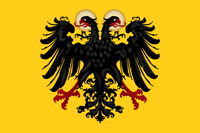 The Holy Roman Empire was a political entity in Western, Central, and Southern Europe that developed during the Early Middle Ages and continued until its dissolution in 1806 during the Napoleonic Wars. From the accession of Otto I in 962 until the twelfth century, the Empire was the most powerful monarchy in Europe. The empire reached the apex of territorial expansion and power in the mid-thirteenth century, but overextending led to partial collapse. Emperor. The two Emperor Cantatas (WoO 87, WoO 88) Beethoven scored were never performed at the time and they remained lost until the 1880s. But they were, according to Brahms, distinctively "Beethoven through and through" and as such prophetic of the tragic style which would mark his music as distinct from the classical tradition.
The Holy Roman Empire was a political entity in Western, Central, and Southern Europe that developed during the Early Middle Ages and continued until its dissolution in 1806 during the Napoleonic Wars. From the accession of Otto I in 962 until the twelfth century, the Empire was the most powerful monarchy in Europe. The empire reached the apex of territorial expansion and power in the mid-thirteenth century, but overextending led to partial collapse. Emperor. The two Emperor Cantatas (WoO 87, WoO 88) Beethoven scored were never performed at the time and they remained lost until the 1880s. But they were, according to Brahms, distinctively "Beethoven through and through" and as such prophetic of the tragic style which would mark his music as distinct from the classical tradition.
Beethoven was probably first introduced to Joseph Haydn in late 1790, when the latter was travelling to London England The Kingdom of Great Britain was a sovereign country in Western Europe from 1 May 1707 to the end of 31 December 1800. The state was created by the 1706 Treaty of Union and ratified by the Acts of Union 1707, which united the kingdoms of England (which included Wales) and Scotland to form a single kingdom encompassing the whole island of Great Britain and its outlying islands, with the exception of the Isle of Man and the Channel Islands. and stopped in Bonn around Christmas time. A year and a half later, they met in Bonn on Haydn's return trip from London to Vienna in July 1792, and it is likely that arrangements were made at that time for Beethoven to study with the old master.
The Kingdom of Great Britain was a sovereign country in Western Europe from 1 May 1707 to the end of 31 December 1800. The state was created by the 1706 Treaty of Union and ratified by the Acts of Union 1707, which united the kingdoms of England (which included Wales) and Scotland to form a single kingdom encompassing the whole island of Great Britain and its outlying islands, with the exception of the Isle of Man and the Channel Islands. and stopped in Bonn around Christmas time. A year and a half later, they met in Bonn on Haydn's return trip from London to Vienna in July 1792, and it is likely that arrangements were made at that time for Beethoven to study with the old master.
HISTORY
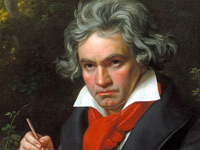
RESOURCES
This article uses material from the Wikipedia article "Ludwig van Beethoven (1770-1827)", which is released under the Creative Commons Attribution-Share-Alike License 3.0.
© Stories Preschool. All Rights Reserved.
